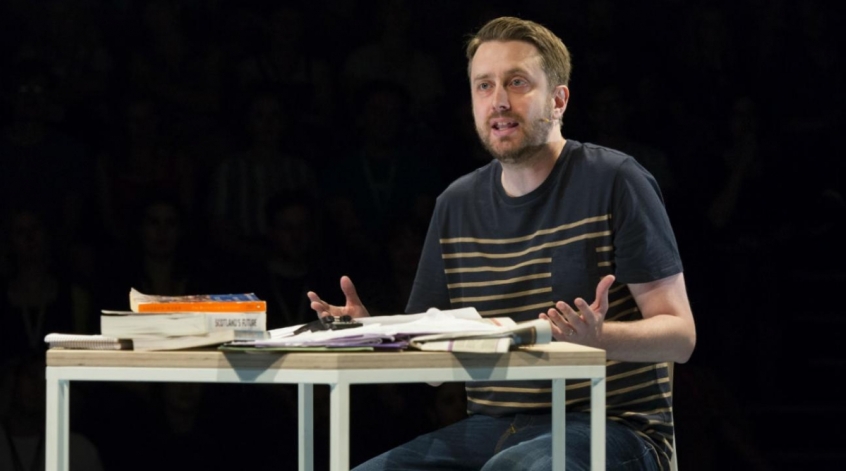
Review of Majority with Rob Drummond, The National Theatre ••••
There is a first time for everything. And that first, was hearing the audience gasp in shock and amazement throughout Rob Drummond's one-man masterpiece, Majority.
The staging is simple. An illuminated circular plinth, a table and mock bee hive hanging above proceedings. As we enter we are all handed electrical key pads so we can vote.
What follows is a forensic, tender demolition of liberalism, utilitarianism and modern intolerance all at the same time. It works by interweaving two strands. On the one hand, the audience vote on various propositions and whether we like it or not, the majority view will prevail. Alongside the votes on ethical and practical issues runs Drummond's madcap flight-of-fancy monologue of his chance encounter with a paranoid, leftist agitator called Eric.
The subtext is Drummond's journey from political apathy to a political being. And behind this lies his great question – how can an individual make a difference?
Along the way Drummond exposes the audience's moral inconsistencies. We begin voting on a simply utilitarian dilemma. Would we push a lever to save a train from ploughing into five people if it meant condemning a single person to death? The audience vote for the numbers game – save five rather than one. But as the evening goes on, the dilemmas become harder and the lines far less easy to draw. What about if we could save five, but our lever-pulling would lead to the death of our own child? Not so simple.
And all this is enmeshed in a touching personal story about Drummond his friendship with his wayward friend and his Tory-voting mother's inconvenient way of puncturing his easy certainties. The story is at once improbable and scarily believable – much in the tradition of the late great Ken Campbell.
What stands out is the sheer stagecraft here. The way the play weaves the personal with the opinions of the audience is something of beauty. It is only as we reach the end that we see the play's real intent. And it is here that Christians need to listen hard. If we are to hold a position strongly, can we honour different positions held equally strongly?
Drummond asks, why can't we disagree agreeably? And more to the point, are we prepared to accept that we may be wrong? To honour any person in a discussion about God, for instance, we need to be prepared to change our own mind if we realise that we are wrong. We must start every interaction with the knowledge that we may be wrong.
At the end of this beautiful and thought-provoking show Drummond asks us to vote on one final proposition. The proposition is that this audience believes it is acceptable to shout at someone who holds a different opinion to us. Ninety-five percent disagree. And again our comfortable liberalism leads to a gentle murmur of approval. But Drummond's not finished. What about the 5% who still think it is OK to shout people down?
This is political and philosophical theatre at its very best. It is also great fun. The only preacher and teacher I can think of with this level of thoughtful prodding is Tim Keller, but then he lacks the sheer creativity, mishief and art of Rob Drummond.
But does theatre work as a way of changing us? Did I come out a more tolerant person? Well in the queue out of the theatre I heart a fellow in front talking. He too, it seems, was writing a review. 'I'm going to give it 2 stars. The story was boring and the voting tricksy.' I wanted to shout at him and tell the fool how wrong he was. I think I need some more work doing on me.
Majority is at the the Dorfman theatre, National Theatre, London, until 28 August. Box office: 020-7452 3000.
Steve Morris is the parish priest of St Cuthbert's North Wembley. Before being a priest he was a writer and ran a brand agency. In the 1980s he tried to become a pop star. Follow him on Twitter @SteveMorris214













